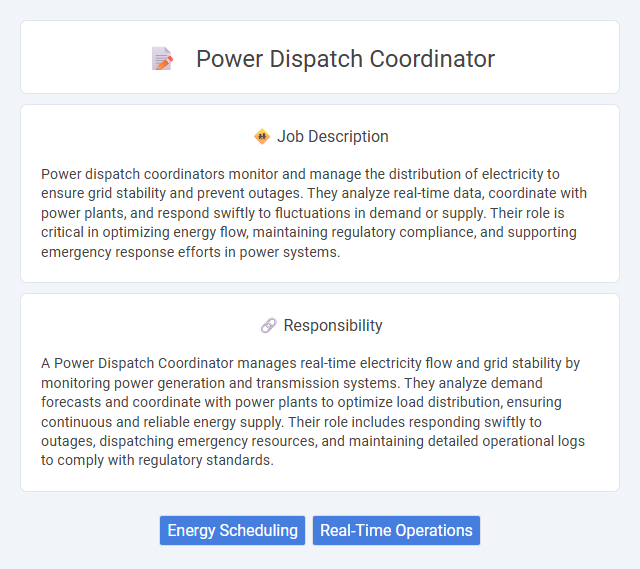
Power dispatch coordinators monitor and manage the distribution of electricity to ensure grid stability and prevent outages. They analyze real-time data, coordinate with power plants, and respond swiftly to fluctuations in demand or supply. Their role is critical in optimizing energy flow, maintaining regulatory compliance, and supporting emergency response efforts in power systems.
Individuals who are highly analytical and able to remain calm under pressure will likely thrive as Power Dispatch Coordinators. This role probably suits those with strong decision-making skills and the ability to manage multiple tasks simultaneously in a fast-paced environment. People who struggle with stress or rapid problem-solving may find the job less suitable.
Qualification
A Power Dispatch Coordinator typically requires a bachelor's degree in electrical engineering, energy management, or a related field, along with industry-specific certifications such as NERC System Operator Certification. Proficiency in power system operations, real-time monitoring tools, and load forecasting is essential to ensure grid reliability and efficient energy distribution. Strong analytical skills, attention to detail, and experience with SCADA systems enhance a coordinator's ability to manage power dispatch effectively.
Responsibility
A Power Dispatch Coordinator manages real-time electricity flow and grid stability by monitoring power generation and transmission systems. They analyze demand forecasts and coordinate with power plants to optimize load distribution, ensuring continuous and reliable energy supply. Their role includes responding swiftly to outages, dispatching emergency resources, and maintaining detailed operational logs to comply with regulatory standards.
Benefit
Power dispatch coordinators likely benefit from improved operational efficiency by managing the real-time distribution of electricity to prevent outages and maintain grid stability. Their role may enhance team communication and coordination, leading to quicker response times during power emergencies. Furthermore, the position probably offers opportunities for career growth within the energy sector due to its critical nature in power system management.
Challenge
Power dispatch coordinators likely face challenges in balancing supply and demand in real-time, requiring quick decision-making to prevent outages. Managing unexpected equipment failures or grid disturbances probably demands strong problem-solving skills and effective communication with field teams. The high-stakes environment may increase stress levels, necessitating resilience and adaptability to maintain grid stability.
Career Advancement
Power dispatch coordinators manage and optimize the real-time distribution of electricity to ensure grid stability and efficiency. With experience in load forecasting, outage management, and energy market operations, these professionals can advance to senior operational roles such as system operators, energy managers, or grid control supervisors. Expertise in smart grid technologies and regulatory compliance further enhances career growth opportunities in the energy sector.
Key Terms
Energy Scheduling
Power dispatch coordinators specialize in energy scheduling by managing the real-time allocation of electricity across the grid to balance supply and demand efficiently. They analyze generation capacity, forecast energy loads, and coordinate with power plants to ensure reliable and cost-effective delivery. Advanced software tools and real-time data monitoring support their decisions to optimize grid stability and prevent outages.
Real-Time Operations
Power dispatch coordinators in real-time operations monitor and control the generation and distribution of electricity to maintain grid stability and prevent outages. They use advanced SCADA systems and energy management software to balance supply and demand while responding to system disturbances instantly. Accurate forecasting, rapid decision-making, and close coordination with field personnel ensure efficient and reliable power delivery.
 kuljobs.com
kuljobs.com